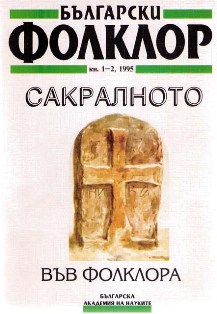Уроците на две десетилетия
Two Decade’s Lessons
Author(s): Todor Iv. ZhivkovSubject(s): Anthropology
Published by: Институт за етнология и фолклористика с Етнографски музей при БАН
Summary/Abstract: Two decades ago the journal “Bulgarian Folklore” was born out of the needs of a newly created institute – the Institute of Folklore at the Bulgarian Academy of Sciences. The science of folkloristics has a place of its own in the Bulgarian scientific episteme, i.e. the scientific knowledge is structured in the boundaries of the national culture without losing the universality of its characteristics. The concept of the genetic nuclea inherited from the Thracian culture is also included here with its influence in the constitution and development of the folklore culture. The Slavonic character of our classical folklore and the mighty synthesis of the written and the oral on the Balkans and in Orthodoxal Europe. “Bulgarian Folklore” reflects the self-determination on the Bulgarian folkloristics. Ivan Shishmanov, Mihail Arnaudov, Petar Dinekov (the first editor in chief of the journal), Tzvetana Romanska and others are among the founders of the Bulgarian school of folkloristics. The journal has connected and is still connecting different scientific traditions – philological, musicological, art-historical, in their efforts to achieve a new knowledge of the culture and especially of the folklore culture. Thus the evaluation of the empirical basis of the folkloristic studies – the very being of the folklore culture with regard to its regional, functional and structural characteristics has become a central issue. Some of the interesting accents are put on the folklore culture of the settlement, the folklore culture seen as the realization of the life cycle of the individual, the ethnic identity of the culture, etc. Totally is changed the very point of view towards folklore – beginning with its appreciation as “living antiquity” and switching to its viewing as cultural universalia, as an everlasting need in all times, communities and persons. The journal has given place to a successful entering in the science of ethnology, through the folklore reality, in urban ethnology (social anthropology), political anthropology, etc. There can be traced two ways of doing a scientific research – seeing the facts as empirically available and their reflection as functioning of mental schemata. This strengthens the place of the Bulgarian folkloristics in the context of the contemporary humanitarian research, fully depicted on the pages of “Bulgarian Folklore” during the twenty years of its publishing.
Journal: Български фолклор
- Issue Year: XXI/1995
- Issue No: 1-2
- Page Range: 5-13
- Page Count: 9
- Language: Bulgarian
- Content File-PDF

